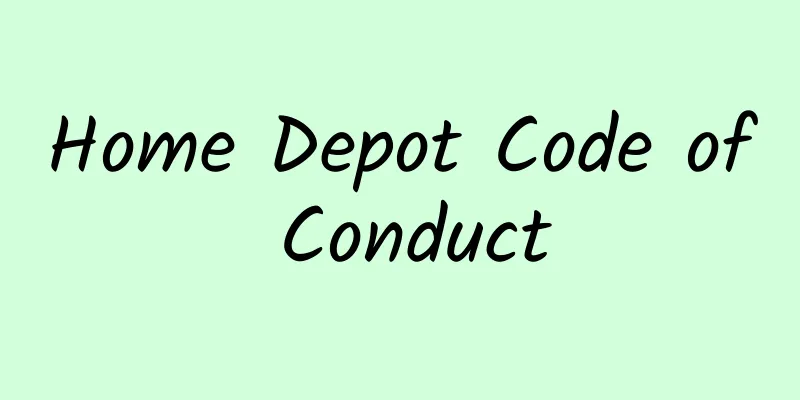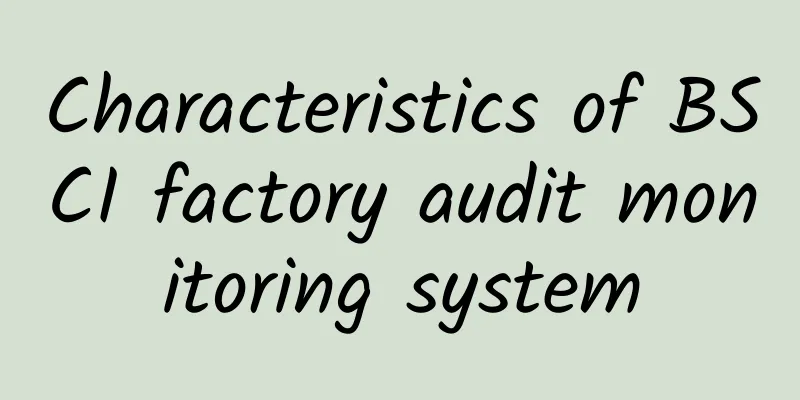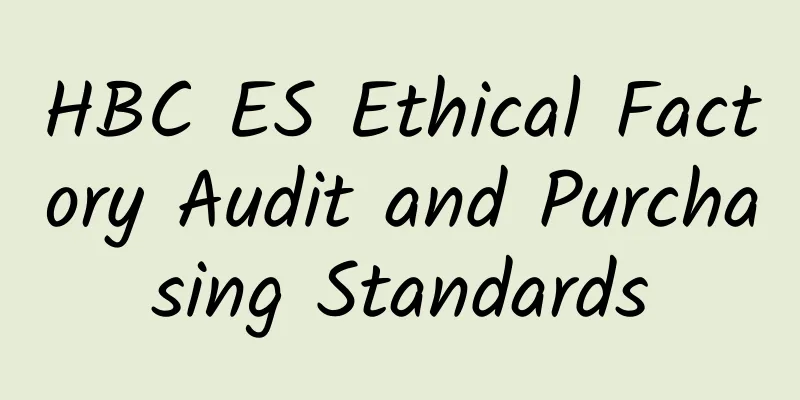Home Depot Code of Conduct

|
Home Depot Code of Conduct <BR>Ethical Standards Home Depot and its affiliates, divisions, and subsidiaries are committed to operating in a responsible manner. As the company establishes branches overseas and works with suppliers around the world to meet the needs of customers, a shared commitment to upholding human rights and providing a safe working environment in the workplace is essential. Home Depot expects all of its suppliers to comply with local laws and regulations in the process of manufacturing and distributing products or providing services to Home Depot. We encourage all suppliers to operate above Home Depot's requirements and continuously improve. Home Depot requires all suppliers to comply with the above regulations and will conduct annual social and environmental responsibility (SER) audits on factories producing licensed brands or patented products. For suppliers producing other products, Home Depot will evaluate the factory's SER or corporate social responsibility program to ensure compliance with Home Depot's regulations below. If the factory does not have an established SER program or corporate social responsibility program, Home Depot will work with the supplier to help them establish an internal monitoring mechanism to ensure that the requirements of this standard are met. Home Depot reserves the right to audit any supplier that manufactures and distributes products or provides services for us. Home Depot expects suppliers/factories to notify Home Depot in writing when the operating address changes. In addition, manufacturers may not transfer products to other locations for production without the consent of the Quality Assurance Department. This guideline briefly describes the minimum requirements that suppliers must comply with when doing business with Home Depot, and these requirements are part of all new or renewed business contracts with Home Depot. Social and Environmental Compliance Requirements Inspection Rights Suppliers must allow Home Depot representatives to audit the production units listed on the Factory Disclosure Information Form, including factory entry, interviews with workers, and all other audit-related documents. Age Requirements Suppliers may not use child labor. Home Depot requires all suppliers to employ workers who are the minimum working age in the local area, and in no case may workers under the age of 14 be employed. If the factory offers an apprenticeship program, it must comply with all relevant local laws and regulations. Forced labor employment must be voluntary. Forced, indentured or bonded labor may not be used to produce products for Home Depot or any of its subsidiaries. Deception Suppliers must ensure that all factory records, work cards and other documents accurately reflect actual production conditions. Suppliers must ensure that all products sold to Home Depot do not violate patent, trademark or copyright laws and provide all necessary certifications if requested by Home Depot. Wages and Working Hours Suppliers must establish effective mechanisms to verify and accurately record employee wages, deductions and working hours. Suppliers must comply with all legal requirements regarding wages and salaries in the country where they are located, including normal working hours wages, overtime wages, maximum permitted working hours, piecework wages and other laws and regulations related to employee benefits. Non-discrimination in hiring workers should be based on individual ability rather than personal characteristics. This includes but is not limited to hiring, wages, benefits, promotions, discipline or dismissal. Home Depot requires its suppliers to respect workers and maintain their dignity. Suppliers must ensure that no corporal punishment of any kind is used in the workplace. Environment, Health and Safety Home Depot requires suppliers to comply with local laws and regulations to provide employees with a safe and healthy working environment to avoid accidents and incidents at work. If employers provide employee dormitories, they must ensure a safe and healthy living environment and comply with all relevant local laws and regulations. Suppliers are encouraged to provide personal protective equipment to workers exposed to hazardous working conditions. Suppliers are encouraged to comply with local/national laws and regulations when storing, managing and disposing of waste. Emergency Plan Emergency exits in factory areas and dormitory areas must be kept accessible. Freedom of Speech and Association Production units must respect the right of workers to freely join legal organizations and must not interfere with workers' exercise of this right. Audits Home Depot authorized suppliers, branded or proprietary product manufacturers will be audited annually. To ensure that suppliers continue to meet SER requirements, Home Depot will conduct unannounced audits of factories. Audit costs are borne by the supplier. All SER audits are based on national/local laws or Home Depot's standards (if not required by local laws). Corrective Action If a supplier is found to have non-conformances during the audit, the supplier must take appropriate corrective actions to correct the non-conformance and prevent recurrence within the time required by Home Depot. Environmental Requirements Home Depot seeks to work with suppliers who share our commitment to ensuring environmental excellence. Suppliers are required to comply with environmental laws in their respective countries. Suppliers are expected to purchase wood and wood products that comply with forest certification systems whenever feasible and promote the efficient and responsible use of wood and wood products. Supply Chain Security Home Depot takes supply chain security very seriously. Due to the growing threat of global terrorism, we have joined the U.S. Customs C-TPAT program and taken other measures to strengthen existing internal security measures. Home Depot also requires suppliers to meet minimum security standards. Suppliers should establish relevant processes and procedures and ensure that unauthorized goods or personnel cannot enter the containers of Home Depot and its subsidiaries. Therefore, suppliers should have written security procedures at least for the following standards established by CBP. Home Depot reserves the right to evaluate the implementation of supplier security plans and their production plants/warehouses. If a supplier's production unit does not take adequate security measures, it will jeopardize the relationship with Home Depot. The following standards set out the minimum requirements that suppliers must comply with and must meet these requirements to do business with Home Depot. However, Home Depot recognizes the differences in the business environment for suppliers in different countries/regions, and we expect suppliers to operate at a level higher than this minimum standard. Home Depot will handle different cases based on actual conditions. Home Depot encourages all suppliers to operate above this minimum standard and to continuously improve. Container Security Suppliers must establish container loading procedures to prevent unauthorized goods or personnel from entering the container. All fully loaded containers shipped to the United States must be sealed with high security seals (compliant with PAS ISO 177712 standards). Containers must be stored in a secure area to avoid unauthorized access and/or manipulation while at the supplier's production unit. Factory/Warehouse Physical Security The materials used in the building must be able to resist unauthorized entry. Physical security includes: adequate locking devices, adequate lighting and perimeter security. The factory/warehouse access control supplier should establish security procedures to prevent unauthorized access to all loading/unloading platforms and areas. Vendor access control includes: Systems for effective identification of employees, visitors and vendors. There must be procedures for identifying, questioning, and reporting unauthorized personnel. Factory/Warehouse Personnel Security Personnel screening is conducted during the recruitment process, including background checks and employee interviews, to the extent permitted by local law. Factory/Warehouse Security Training and Awareness Suppliers must have or establish a security awareness program that focuses on training employees on hazard awareness and supply chain security issues. All employees of the supplier must receive such training. Information Security All automated systems of the supplier should only be accessible through a single account, and passwords must be changed regularly. Suppliers must establish an information security policy and provide training to all employees. Suppliers agree to use reasonable commercial pressure to ensure that their suppliers and transporters implement the recommendations for third-party goods shipped to Home Depot at any point in the process where the supplier does not control the production or transportation of the product. On-site Assessments To ensure proper implementation and compliance with the minimum standards of this Code, Home Depot reserves the right to conduct unannounced factory inspections at the supplier's expense. Corrective Actions If a supplier's factory that produces products for Home Depot or its subsidiaries is found to be in violation of the requirements of this standard, Home Depot reserves the right to take appropriate corrective actions. Home Depot has the sole right to interpret and enforce this standard. Annual Notification Home Depot requires C-TPAT certified suppliers to provide a copy of their C-TPAT certificate and SVI number. Suppliers must also complete and submit a self-assessment questionnaire developed by Home Depot Global Business Services for record. Home Depot's Requirements for Imports from High-Risk Countries Home Depot uses a range of methods to monitor global security issues and then classifies different countries as high, medium, and low risk. For countries that Home Depot considers high risk, we reserve the right to select a third-party security agency to contact the supplier directly. Home Depot will take care of all details including the audit at the factory or port (including but not limited to providing the audit checklist to the safety agent, scheduling the audit date and time) The third party must provide a copy of the documentation required by the supplier for audit to Home Depot for its records. It is the supplier's responsibility to ensure that the relevant fees to the third-party auditor are paid on time (45-day payment period). Home Depot only recognizes contracts signed between third-party organizations and suppliers, and suppliers should provide a copy of the contract to Home Depot's Global Business Services Manager. Any violation that does not meet this safety standard will result in an "Audit Failure" result. |
>>: New factory inspection requirements: woolworths factory inspection
Recommend
EICC Certification Health and Safety Audit
1. Factory building structure safety certificate ...
What is ProdSG? What are the new changes to ProdSG?
When doing cross-border foreign trade, it is impo...
Walmart's new policy has led to strikes in stores across the country to protest against the comprehensive working hours system. What happened?
On May 17, 2016, real news came out from Walmart ...
Customer factory audit - Chicos factory audit behavior standards
Chicos Factory Audit Standards of Conduct 1. Legal...
How is Furunde? What are the advantages of Furunde?
How about Furunde? Shenzhen Furunde Supply Chain ...
SA8000 Certification Management Review
SA8000 Certification Management Review Products C...
2020 version of STANDARD 100 by OEKO-TEX product certification test standards and limit value requirements
Starting from 2020, OEKO-TEX has updated the test...
Factory Hygiene Management in BSCI
1.0 Purpose: In order to improve the sanitation of...
ACC certification fee
ACC fees are divided into two parts: annual regis...
How do European and American customers conduct factory inspections? Why do they conduct factory inspections?
Since 2002, European and American customers have f...
What is FOTOLOG? What are the functions of FOTOLOG?
FOTOLOG is the first service provider in the Chin...
How about Jitong International Freight? What services does Jitong International Freight provide?
How about Jitong International Freight? JiTong In...
Major update I CCS version change is imminent, affecting not only GRS
If we were to vote for the top ten buzzwords of t...
What is the difference between Shopee’s no-source and Amazon’s no-source? Which one should a novice choose?
I think everyone should be familiar with Taobao&#...
AVE Certification Work Clothing Certificate Issuance and Use Guidelines--AVE Certification
AVE Certified Work Clothing Certificate Issuance a...









